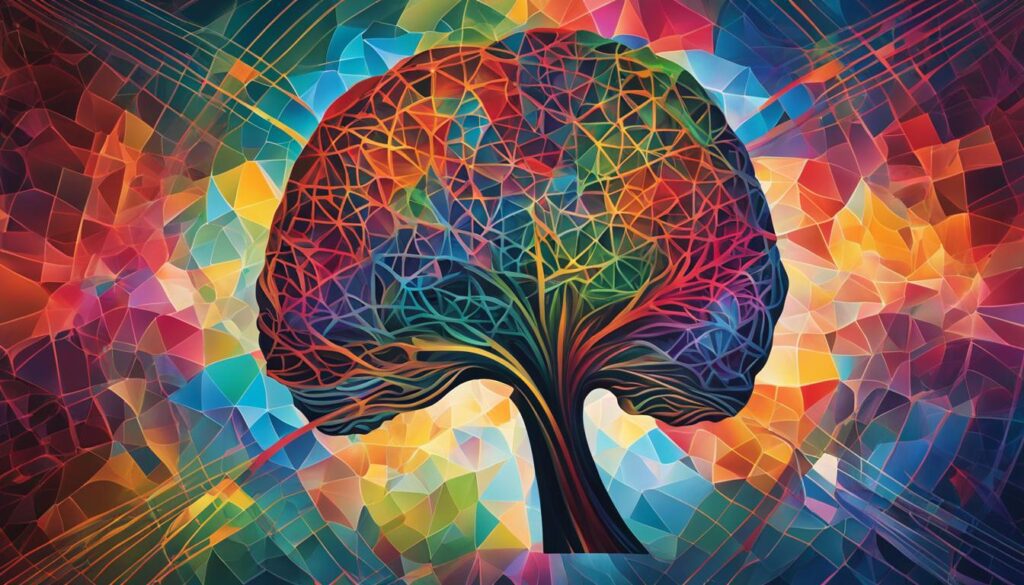Welcome to our comprehensive guide on understanding mental health! Mental health is an important aspect of our overall well-being, encompassing our emotional health, psychological well-being, and mental wellness. In this guide, we aim to provide you with a clear understanding of what mental health entails and how it plays a significant role in both your personal and professional life.
From delving into the basics of mental health to exploring the spectrum of mental health disorders, we will be equipping you with the knowledge and tools to navigate this intricate topic. So, buckle up as we embark on this journey to better understand and appreciate the critical role mental health plays in our lives.
Key Takeaways
- Learn the fundamentals of understanding mental health, including emotional health, psychological well-being, and mental wellness.
- Explore the multifaceted nature of mental health and how it complements physical health in ensuring overall well-being.
- Discover the spectrum of mental health disorders, covering common conditions like depression, anxiety, and bipolar disorder.
- Recognize the signs and symptoms of mental health challenges, emphasizing the importance of early intervention.
- Unravel effective coping strategies for stress and mental health challenges, promoting psychological resilience in everyday life.
- Navigate through various therapy and counseling options to find the best-suited treatment for your mental health needs.
- Dive into the importance of building a powerful support system and incorporating a holistic approach to maintain mental fitness.
What Is Mental Health and Why Does It Matter?
Mental health is a vital aspect of our overall well-being, encompassing emotional, psychological, and social factors. When considering the mental health definition, we must take into account its multifaceted nature, as well as its relevance for each individual.

The Multifaceted Nature of Mental Well-being
Understanding mental health requires exploring the various elements that contribute to our emotional balance, psychological resilience, and social connections. These components interact and influence one another, determining how we perceive and react to the world around us. Some key aspects of mental well-being include:
- Cognitive functioning: Our ability to think, learn, and solve problems depends on our mental health, which directly affects our performance in both personal and professional settings.
- Stress management: A healthy mental state enables us to cope with daily stressors and challenges, fostering adaptability and equipping us with emotional wellness tips for navigating difficult situations.
- Relationships: Healthy mental well-being promotes positive interpersonal connections, allowing us to form and maintain meaningful relationships with others.
- Decision-making: Our mental health shapes the choices we make, guiding our thought processes and influencing the course of our lives.
Maintaining mental health is essential for successful coping and adaptation in life, enabling us to live joyful, fulfilling lives and make meaningful contributions to society.
Mental Health vs. Mental Illness: Clearing the Confusion
There is often confusion between mental health and mental illness, but understanding the distinctions between the two is crucial for promoting well-being and mental illness prevention. Mental health refers to a state of well-being, where individuals are capable of realizing their own potential, managing stressors, forming and maintaining relationships, and contributing to society.
Mental health goes beyond the absence of mental disorders and includes a state of well-being where individuals realize their own abilities and cope with the normal stresses of life.
On the other hand, mental illness refers to a spectrum of psychological disorders that affect an individual’s thoughts, feelings, behaviors, and overall functioning. Mental illnesses include conditions such as depression, anxiety, bipolar disorder, and many others. It is essential to recognize that mental health and mental illness are not mutually exclusive; individuals can experience varying degrees of mental health and illness throughout their lives.
The key takeaway is that mental health is a complex, multifaceted concept, and understanding its nuances helps us appreciate the importance of maintaining mental well-being and promoting mental illness prevention. Ensuring that society is well-informed about mental health and its implications can lead to a more compassionate, empathetic, and supportive environment for all.
The Spectrum of Mental Health Disorders
Mental health disorders encompass a wide range of conditions that have a profound impact on a person’s thoughts, feelings, and behavior. These disorders can vary in intensity and duration, affecting various aspects of an individual’s life. This section will delve into the most prevalent mental health disorders, their symptoms, and the challenges they pose.

Common Psychological Disorders and Symptoms
Some of the most common psychological disorders include depression, anxiety, bipolar disorder, mood disorders, and personality disorders. Each of these conditions has distinct symptoms and manifestations.
- Depression is characterized by persistent feelings of sadness, hopelessness, and loss of interest in daily activities. Common symptoms include fatigue, difficulty concentrating, changes in appetite and sleep patterns, and even suicidal thoughts.
- Anxiety disorders involve persistent and excessive worry or fear that interferes with daily functioning. Symptoms may include restlessness, irritability, difficulty concentrating, and physical symptoms like rapid heartbeat and shortness of breath.
- Bipolar disorder is a mood disorder involving episodes of mania, characterized by extreme energy and activity levels, and periods of depression. Symptoms can differ significantly during each phase.
- Mood disorders, such as major depressive disorder and bipolar disorder, involve disturbances in mood and emotional states that can significantly impact a person’s daily life.
- Personality disorders are characterized by long-lasting patterns of thought, behavior, and interactions that deviate from societal norms and cause distress to the individual or others. Examples include borderline personality disorder, narcissistic personality disorder, and antisocial personality disorder.
Understanding Depression and Anxiety
Depression and anxiety are two of the most common mental health disorders, affecting millions of people worldwide. It is crucial to differentiate between temporary bouts of sadness or worry and clinical depression or anxiety disorders. These disorders can have lasting impacts on a person’s daily functioning, relationships, and overall quality of life.
Anxiety management techniques, such as deep breathing, meditation, exercise, and cognitive restructuring, can be effective in mitigating symptoms associated with anxiety disorders.
Similarly, understanding depression symptoms and seeking appropriate help is essential for managing the condition. Professional help, therapy, medication, and self-care strategies, such as regular exercise and a healthy diet, can contribute to alleviating depression symptoms.
Highlighting Mood and Personality Disorders
Mood disorders, like bipolar disorder, involve fluctuations in an individual’s emotional states. These changes can be dramatic and have significant consequences on a person’s daily life and relationships. Managing bipolar disorder typically involves mood stabilizing medications, therapy, and self-care routines.
Personality disorders, on the other hand, affect an individual’s interactions and perceptions of themselves and others. These disorders often result in lifelong patterns of behavior and thinking that deviate from societal norms and expectations. Therapy, medication, and support can help individuals with personality disorders effectively manage their symptoms and lead more fulfilling lives.
Recognizing the Signs: Mental Health Symptoms to Watch For
Being aware of mental health symptoms and understanding the signs of a potential mental health challenge can lead to early intervention and prevention of more serious issues. Mental health awareness plays a critical role in educating and encouraging people to recognize changes in their own or others’ thoughts, feelings, and behaviors. In this section, we will walk you through various mental health symptoms to watch for and provide guidance on promoting mental health awareness.
- Changes in mood: Persistent feelings of sadness, irritability, or extreme fluctuations between highs and lows can indicate an underlying mental health issue.
- Difficulty concentrating: Struggling to focus, make decisions, or remember information may be a sign of cognitive impairment or heightened stress.
- Withdrawal from social activities: Isolation and reduced interest in previously enjoyable activities can point to a decline in mental well-being.
- Increased or irregular sleep: Either excessive or inadequate sleep, along with disturbances in sleep patterns, may reflect an underlying issue.
- Changes in appetite or weight: Unintended weight loss or gain and significant fluctuations in eating patterns can signal a potential mental health concern.
By recognizing the signs of mental health symptoms, you can take early action to seek help and support for yourself or someone you care about.
Mental health challenges can manifest differently in each individual. Therefore, it’s crucial to pay attention to both subtle and overt changes in behavior and emotions. The following table presents some common mental health disorders along with their key symptoms:
| Mental Health Disorder | Key Symptoms |
|---|---|
| Depression | Persistent sadness, loss of interest, fatigue, feelings of worthlessness, thoughts of suicide |
| Anxiety | Excessive worry, restlessness, irritability, concentration difficulties, sleep disturbances |
| Bipolar Disorder | Alternating periods of intense happiness and extreme sadness, impulsivity, irritability |
| Obsessive-Compulsive Disorder (OCD) | Recurring thoughts or actions, compulsive behaviors, intrusive thoughts, distress caused by obsessions |
| Post-Traumatic Stress Disorder (PTSD) | Flashbacks, nightmares, intrusive memories, emotional numbness, avoidance of reminders of the trauma |

In conclusion, increasing mental health awareness and recognizing the signs of mental health symptoms can lead to early intervention and better outcomes for those dealing with mental health challenges. Encourage open conversations about mental health, promote education around the topic, and provide a supportive environment for those seeking help.
Mental Health Awareness and the Fight Against Stigma
Mental health stigma is a pervasive issue that affects individuals with mental health conditions and contributes to the barriers they face in receiving appropriate care and support. One of the key factors in combating mental health stigma is understanding societal perspectives on mental illness and the importance of mental health advocacy initiatives.
Societal Perspectives on Mental Illness
Public opinion about mental illness can be influenced by numerous factors, such as cultural beliefs, media portrayals, and personal experiences. Stereotypes about individuals with mental health conditions often paint them as dangerous, unpredictable, or weak, leading to discrimination and marginalization. This can result in affected individuals being hesitant to seek help or disclose their condition to others.
“The greatest barrier to seeking help and recovery from mental illness is not the illness itself—it’s the stigma.” – Glenn Close, actress and mental health advocate
Mental health advocacy efforts aim to challenge these misconceptions and promote a more compassionate and informed understanding of mental illness.
The Power of Open Conversation
Sharing personal stories about mental health struggles, asking questions, and engaging in open dialogue are powerful tools in dismantling stigmas surrounding mental illness. By fostering an environment where individuals feel comfortable discussing their challenges, we can educate ourselves and others while providing valuable support.
- Encourage people to share their lived experiences.
- Listen with empathy and an open mind.
- Collaborate to raise awareness and educate others.
- Encourage respectful language around mental health.
- Support mental health resources and organizations.
- Advocate for policies that promote equitable mental health care access.

Mental health stigma is a complex issue with deep-rooted causes, and it takes time and effort to bring about change. However, when individuals and communities come together, we can collectively reduce stigma and offer much-needed support to those navigating mental health challenges. The power of open conversation, education, and understanding cannot be underestimated in promoting acceptance, empathy, and a brighter future for mentalhealth.
Effective Coping Strategies for Stress and Mental Health Challenges
Managing stress and mental health challenges is crucial for maintaining overall well-being and leading a balanced life. While experiencing stress is a normal part of life, it is essential to learn effective coping strategies for stress reduction and overcoming mental health challenges. This section will discuss various techniques like mindfulness, time management, and relaxation exercises that can be incorporated into your daily routine for improved psychological resilience.

Mindfulness as a Stress Reduction Technique
Mindfulness is a powerful tool for managing stress and promoting mental health. It involves staying present in the moment and non-judgmentally observing your thoughts, feelings, and bodily sensations. This heightened self-awareness helps you identify unhealthy patterns, respond more effectively to stressors, and remain calm during challenging situations. Some common mindfulness practices include meditation, deep breathing exercises, and body scan techniques.
“Mindfulness means paying attention in a particular way; on purpose, in the present moment, and nonjudgmentally.” – Jon Kabat-Zinn
Time Management for Improved Mental Health
Effective time management is crucial for alleviating stress and balancing professional and personal commitments. By managing your time wisely, you can avoid excessive workload, reduce stress, and ultimately improve your mental health. Some proven time management strategies include setting priorities, breaking tasks into smaller steps, using a planner, and setting deadlines for essential tasks.
Relaxation Exercises for Stress Relief and Mental Well-Being
Relaxation techniques are essential tools for managing stress and boosting mental health. These strategies help calm the mind, reduce anxiety, and improve emotional equilibrium in your daily life. Some popular relaxation exercises include:
- Progressive muscle relaxation: A technique that involves tensing and relaxing specific muscle groups.
- Deep breathing exercises: Controlled breathing techniques aimed at improving focus and inducing relaxation.
- Visual imagery: Guided mental imagery or visualization to create a peaceful and calming environment.
- Yoga and tai chi: Gentle physical practices that integrate breath, movement, and mindfulness for stress reduction.
Incorporating Coping Strategies into Your Daily Routine
To effectively manage stress and mental health challenges, it is essential to integrate these coping strategies into your daily routine. Consistency and regular practice will help you develop resilience and better handle stressors. Here are some tips to incorporate these strategies into your daily life:
| Strategy | Implementation |
|---|---|
| Mindfulness | Practice mindfulness during daily activities like walking, eating, or even working. Set aside time for meditation or guided mindfulness exercises. |
| Time Management | Start your day by reviewing your to-do list, prioritize tasks, and allocate time for each task. Update your planner regularly to adjust for changes in priorities. |
| Relaxation Exercises | Schedule short relaxation breaks throughout your day. Choose a technique that resonates with you and practice it consistently to reap its benefits. |
By incorporating these coping strategies for stress and mental health challenges into your daily routine, you will gradually develop the resilience and emotional stability to face life’s ups and downs with greater ease and equanimity.
Therapy and Counseling: Navigating Through Psychological Treatment Options
When it comes to mental health treatment, there is a plethora of therapy and counseling options available. Understanding the different psychotherapy techniques can help you make an informed decision and choose a treatment plan that best suits your unique needs. In this section, we will explore various therapeutic approaches and discuss the impact of Cognitive Behavioral Therapy (CBT) on mental health.

Different Approaches to Psychotherapy
Psychotherapy is a general term encompassing a range of psychological treatment options. Each method aims to improve mental health and overall well-being by addressing thought patterns, emotions, and behaviors. Here are some common therapeutic approaches:
- Psychodynamic Therapy: This approach is based on the idea that unresolved unconscious conflicts from childhood can lead to mental health issues. Psychodynamic therapy helps individuals gain insight into these conflicts to promote emotional healing and growth.
- Humanistic Therapy: This type of therapy focuses on the belief that individuals naturally strive for self-improvement and personal growth. Humanistic therapy aims to help clients develop self-awareness and self-acceptance to reach their full potential.
- Behavioral Therapy: Grounded in the principles of learning theory, behavioral therapy seeks to alter unhealthy behaviors through various techniques, such as classical conditioning, operant conditioning, and social learning.
| Therapeutic Approach | Core Principles | Common Techniques |
|---|---|---|
| Psychodynamic Therapy | Unconscious conflicts from childhood impact mental health | Free association, dream analysis, transference |
| Humanistic Therapy | Individuals naturally strive for personal growth and self-actualization | Client-centered, Gestalt, existential therapy |
| Behavioral Therapy | Learned behaviors contribute to mental health issues | Systematic desensitization, exposure therapy, modeling |
It is essential to consider your unique needs, preferences, and goals when choosing a therapeutic approach. A mental health professional can help assess your situation and guide you towards the most suitable therapy.
Cognitive Behavioral Therapy and Its Impact
Cognitive Behavioral Therapy (CBT) is a type of psychotherapy that has gained popularity due to its proven efficacy in treating various mental health disorders. CBT is grounded in the idea that dysfunctional thoughts and beliefs contribute to emotional distress and maladaptive behaviors.
CBT aims to identify and modify these negative thought patterns by teaching clients to recognize and challenge irrational beliefs. Clients are encouraged to develop healthier and more adaptive thought processes and behaviors in response to life’s challenges. Some common techniques used in CBT include:
- Thought monitoring and journaling
- Rational emotive therapy
- Problem-solving skills
- Relaxation techniques
“Cognitive Behavioral Therapy helps individuals change their thought patterns and behaviors to overcome mental health challenges and improve overall well-being.”
CBT has been demonstrated as an effective treatment for numerous mental health disorders, including depression, anxiety, panic disorders, obsessive-compulsive disorder, and post-traumatic stress disorder. The CBT impact on mental health treatment can be substantial, leading to improved emotional well-being, increased resilience, and a better quality of life.
In conclusion, understanding the different therapy and counseling options available can significantly impact your mental health journey. While choosing the right therapeutic approach is a personal decision, it is essential to consult with a mental health professional to help guide you in your decision-making process. Keep an open mind, and remember that the most important aspect of therapy is finding a method that feels right for you and supports your path towards mental well-being.
Building a Support System: Mental Health Support Services
When it comes to managing mental health, having a strong support system plays a vital role in your journey towards emotional well-being. This support network not only provides encouragement and strength but also makes the healing process smoother and more effective. This section will discuss various mental health support services available, such as support groups, hotlines, and community resources. It will offer guidance on building and accessing a support network to promote sustained mental health care.

| Support Service | Description | Examples |
|---|---|---|
| Support Groups | Support groups are gatherings of people who share similar experiences or concerns. They provide an environment for mutual understanding, empathy, and encouragement. | National Alliance on Mental Illness (NAMI) support groups, American Foundation for Suicide Prevention (AFSP) support groups, Depression and Bipolar Support Alliance (DBSA) groups |
| Helplines and Hotlines | These services offer immediate emotional support, crisis intervention, and information on mental health resources over the phone or via text messaging. | National Suicide Prevention Lifeline, Crisis Text Line, Veterans Crisis Line, National Runaway Safeline |
| Community Resources | These resources provide accessible mental health services and programs in local communities, such as counseling, therapy, and case management. | Community mental health centers, non-profit organizations, faith-based organizations, school programs |
“Connection is why we’re here; it is what gives purpose and meaning to our lives.” – Brené Brown
When seeking a support network for mental health, consider the following steps:
- Identify your needs and preferences: Knowing what type of assistance you require can help direct you towards the most suitable resources.
- Research available options: Look for support groups for mental health online, ask mental health professionals for recommendations, or reach out to local organizations.
- Participate actively: Engage in the support system that works best for you, attending meetings or participating in discussions as much as possible.
- Be open and understanding: Embrace the shared experiences of others within the group, creating a safe and accepting environment for everyone involved.
It’s crucial to remember that no single support system or service will fit everyone’s unique needs – explore the options available to you and select those that resonate with you the most. With the right combination of mental health support services and professional help, you can overcome mental health challenges and build a strong foundation for emotional well-being.
Mental Health and Lifestyle: Holistic Approaches to Maintaining Mental Fitness
Maintaining excellent mental health and lifestyle goes hand in hand. Our daily choices play a critical role in our mental fitness, and integrating holistic approaches into our lives can significantly enhance overall well-being. This section will discuss embracing mental wellness in everyday life, focusing on self-care, relaxation techniques, and social connections. We’ll also explore the significance of nutrition, exercise, and sleep in nurturing emotional health.
Incorporating Mental Wellness into Everyday Life
Striking the right balance between work and leisure is essential for optimal mental health. When you prioritize self-care and engage in activities that bring joy and relaxation, your mental fitness will thrive. Consider the following tips for embracing mental wellness in your daily life:
- Carve out time for hobbies and passions
- Practice mindfulness, meditation, or deep breathing exercises
- Maintain a strong social support system
- Schedule downtime for rest and relaxation
- Set healthy boundaries in your personal and professional life
Remember, committing to regular self-care and staying connected with loved ones fosters resilience and enhances overall mental well-being.

Nutrition, Exercise, and Sleep: The Pillars of Emotional Health
Nutrition, exercise, and sleep are critical in providing the necessary foundation for mental and emotional health. Adopting a balanced lifestyle that includes proper nutrition, regular physical activity, and sufficient sleep can significantly improve emotional well-being.
“Our physical and mental health are inextricably linked, and taking care of your body is an essential part of maintaining a healthy mental state.”
Consider the following suggestions for incorporating nutrition, exercise, and sleep as essential components of your mental fitness journey:
| Nutrition | Exercise | Sleep |
|---|---|---|
| Eat a balanced diet rich in fruits, vegetables, lean proteins, whole grains, and healthy fats | Engage in at least 30 minutes of moderate exercise most days of the week | Establish a consistent sleep schedule |
| Stay hydrated and limit caffeine and alcohol consumption | Choose an enjoyable exercise routine | Create a calming bedtime routine |
| Be mindful of portion sizes and avoid emotional eating | Include strength training and flexibility exercises in your routine | Aim for 7-9 hours of sleep per night |
By focusing on these pillars of emotional health, you’ll build a strong foundation for mental fitness and cultivate a fulfilling lifestyle that supports your mental well-being.
Conclusion
As we’ve explored throughout this guide, mental health is a crucial aspect of overall well-being that deeply affects every individual. By actively engaging in mental health education and participating in mental health advocacy efforts, we can work collectively to dismantle misconceptions, challenge unnecessary stigmas, and create a supportive environment for addressing mental health challenges.
Mental health is a conversation that needs to continue beyond awareness campaigns and events. It is essential to integrate mental health best practices into various areas of our lives, such as our workplaces, schools, and communities. Mental health in the workplace is a significant area where increased understanding and support can significantly impact the daily experiences of countless individuals.
In conclusion, collectively striving for mental wellness can lead to a more empathetic, compassionate, and informed society. By continuing the conversation on mental health, we ensure that the pursuit of understanding, empathy, and assistance for those facing mental health challenges remains a priority. So, let’s strive to make mental health a central part of our lives, our relationships, and our communities, and make the world a healthier and more supportive place for all.
FAQ
What is the difference between mental health and mental illness?
Mental health is a state of well-being in which individuals realize their own abilities, cope with the normal stresses of life, work productively, and contribute to their communities. Mental illness, on the other hand, refers to a wide range of psychological disorders that can disrupt a person’s thinking, feeling, mood, or behavior, impacting their ability to function in everyday life.
What are some common mental health disorders?
Common mental health disorders include depression, anxiety, bipolar disorder, mood disorders, and personality disorders. These conditions can vary in severity and impact an individual’s ability to function in daily life. Early recognition of symptoms and appropriate treatment can significantly improve outcomes for those affected.
How can I recognize the signs of a mental health challenge?
Mental health challenges may present themselves through various signs, such as changes in mood, behavior, or thought patterns. Some common indicators include prolonged sadness, excessive worry, withdrawal from social activities, sudden shifts in energy levels, and difficulty concentrating. Being proactive in observing these changes in yourself or others can lead to early intervention and treatment.
What are some effective coping strategies for managing stress?
Effective coping strategies for managing stress include practicing mindfulness, engaging in physical activity, prioritizing self-care, setting realistic goals, and seeking social support. Incorporating these techniques into daily life can help build psychological resilience and improve overall mental well-being.
How does therapy and counseling support mental health?
Therapy and counseling provide a safe space for individuals to explore their thoughts, feelings, behaviors, and experiences with the guidance of a trained mental health professional. Various therapeutic approaches can help individuals gain insight, develop coping strategies, and overcome challenges related to their mental health. A key benefit of therapy is its potential to foster lasting change in thought patterns and behaviors that contribute to mental health issues.
How can I find mental health support services?
Mental health support services may include support groups, hotlines, online forums, and community resources. Consult with a healthcare professional, visit mental health websites, or reach out to local organizations to locate available services in your area. Building and maintaining a strong support system can be crucial for sustained mental health care and recovery.
How does lifestyle influence mental health?
Daily lifestyle choices like nutrition, exercise, sleep, and social connections significantly impact mental health. Maintaining a balanced diet, engaging in regular physical activity, getting enough restful sleep, and nurturing social relationships can all help foster mental wellness and prevent the onset of mental health challenges.
How can I advocate for mental health awareness and education?
Advocating for mental health awareness and education can involve sharing information, promoting understanding, participating in awareness events, and supporting policies that prioritize mental well-being. By engaging in these efforts, individuals can contribute to breaking down stigma, promoting early intervention, and fostering supportive environments for mental health care and treatment.


